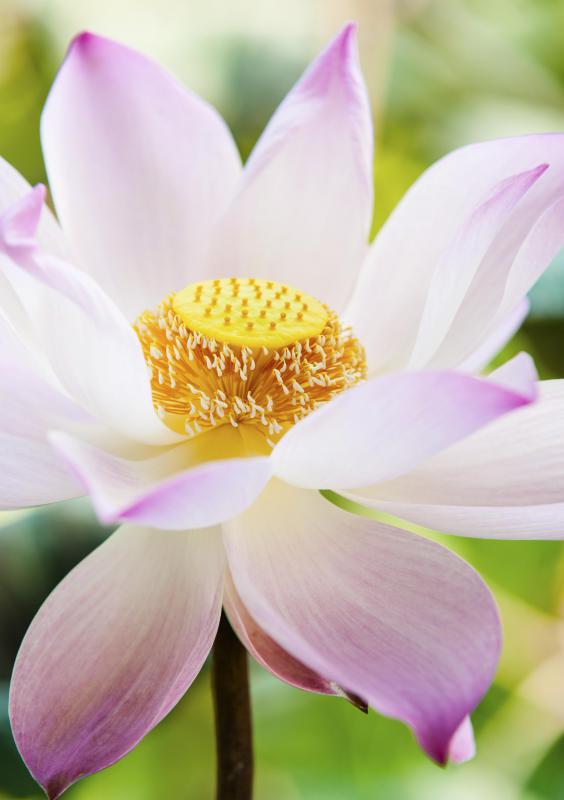At TheHealthBoard, we're committed to delivering accurate, trustworthy information. Our expert-authored content is rigorously fact-checked and sourced from credible authorities. Discover how we uphold the highest standards in providing you with reliable knowledge.
What is Lotus Leaf?
The lotus leaf (Nelumbo nucifera) is an aquatic perennial that is closely related to the common water lily (Nelumbo lutea). This plant has white flowers with light green leaves and grows throughout the tropical regions of Asia and the Middle East. Known by many other names including the sacred lotus, Indian lotus, Chinese arrowroot, and Egyptian bean, it has an extensive history. In fact, the sacred lotus has been used as a medicinal herb for thousands of years.
The lotus is popular among various cultures worldwide, depicted in folklore, religion, literature, and art; and has long since been considered sacred by Buddhists, Hindus, and Egyptians. The lotus leaf is the object of meditation in Buddhism. The Hindus believe that Brahma, creator and God of the universe, sprang from a lotus blossom. Egyptians liken the plant with the sun, as its flowers open in the morning and close at night. It is also seen as a symbol of resurrection.

The entire lotus plant has been used in Chinese medicine for treating everything from diarrhea to bleeding ulcers. Lotus leaves were also highly regarded as a weight-loss cure, as the plant is a diuretic. One of the main functions of the lotus leaf plant is to stop bleeding associated with excessive menstruation, hemorrhoids, and vomiting of blood. All parts of the plant can be used as an astringent and cardio tonic. In addition, lotus is employed as a treatment for mushroom poisoning.

Used with other herbs, the plant can help treat sunstroke, fever, diarrhea, and dizziness. Lotus leaf is also become popular for lowering blood lipids and treating liver conditions, such as jaundice. An active ingredient found in the lotus plant, called nuciferine, is also thought to help reduce muscle spasms. Other conditions that the lotus leaf has been used to treat include leprosy, parasites, ringworm, and sexually transmitted diseases such as syphilis.

Parts of the lotus are prepared in many ways. For instance, the leaves are often used fresh as a poultice, and lotus leaf extract is derived from the dried leaves. The flower petals and leaves are also commonly made into a mild tea, which is slightly bitter. They can be used as a garnish or added to soups as well.
Dried lotus leaf is available at many herbal shops. Additionally, the plant can be found in pill, powder, and capsule form. Lotus is considered safe and has no known negative side effects.
AS FEATURED ON:
AS FEATURED ON:

















Discussion Comments
I'm curious as to whether or not the lotus leaves retain their water repellent traits even after they have been removed from the plant. From that begs the question, how long can these leaves live separated from the plant (or can they live if they remain wet/moist)? will they be able to repel water even if they are dead, but remain wet/moist? Thanks for any help! --Tim.
@VivAnne - The lotus leaf can help improve circulation and cure poisoning from mushrooms or from alcohol at the same time because mushroom and alcohol poisoning aren't in your entire body -- they're in your liver, which as gimbell explained gets more bile and thus better ability to break things down thanks to the lotus root.
When people think of poisoning, they tend to think of poison flowing through the blood stream and all through the body. This is much more characteristic of venom.
Venom and poison get confused all the time, and it's easy to do so; the difference is that venom comes from an injected source, such as an animal bite or sting, while poison is most frequently eaten or drank and then gets into your body's organs.
Mushroom and alcohol poisoning attack the liver (although some poisonous mushrooms can cause organ failure in general, and attack the nervous system as well), so lotus leaf helps to flush out their toxins with the increased bile that the liver produces as a side effect of eating the lotus leaf.
Hope that helps clear things up a bit. Cheers!
How does lotus leaf help to treat mushroom poisoning? I'm super curious how it would help prevent poisoning, since one of the lotus leaf side effects that gimbell mentioned is that it increased your circulation. Wouldn't that be really bad for any kind of poisoning?
It's also interesting that the same plant that increases your blood circulation and strengthens your blood also decreases bleeding. It makes blood flow better, but stops you from bleeding if you aren't supposed to be...? How does it do that?
Don't get me wrong, I'm not against people using lotus leaf for medicinal purposes. In fact, i think it's great that there is an herbal concoction that will help treat so many different things without having any negative side effects at all. I'm just curious how it works the way that it does.
@malmal - That's pretty cool! I'll bet that the unique surface texture with the bits sticking out is also why lotus leaves float so well. They probably push the water away from them even while laying on top of the surface.
The self-cleaning properties you described seem very interesting. I'll bet if we used this kind of coating that scientists made on buildings, cars and other things that are exposed to the weather a lot, they would pretty much clean themselves!
Is the stuff shiny like a lotus leaf? Does it look anything like the texture of one?
If so, it probably would look a bit funky on some of the more useful places to put it -- like the sidewalk. Imagine front porch steps that never grew moss, because the little seeds and microbes and dirt wouldn't stick to them, or metals that never rusted because the water rolled off.
I wonder what more scientific uses they could have for such a substance? Maybe it could be utilized somehow for deep sea diving outfits or something. Or at least the windows of the submarines -- no more silt or algae buildup!
Now I want some of this lotus leaf coating for my fish tank so I don't have to clean the glass anymore.
I swear by lotus leaf tea for weight loss! Unlike a bunch of other weight loss teas that claim to let you drop pounds effortlessly and while still feeling great, lotus leaf tea does not give you diarrhea in the process.
Instead, as the article explains, it is a diuretic -- meaning it makes you need to pee a lot, meaning you won't retain water weight. A huge part (uh, no pun intended) of feeling chubby is bloating, and you feel bloated when you are retaining water weight.
Whether you're holding onto water weight can literally be the only difference between whether you fit into your skinny jeans or not!
Another thing that makes lotus leaf tea a great weight loss aid happens to be something that's good for your body anyway (strange for a dieting thing, I know.) Lotus leaf causes the liver to make more bile than usual, which helps your body break down the fats in your diet better.
Finally, lotus leaf tea actually improves your circulation and makes your blood healthier. I highly recommend this stuff to anybody wanting to lose weight without harming their body!
Usually the best examples of things that science can do better come from nature, and I think the lotus leaf is one of the prime examples of that.
The lotus leaf has been admired and awe-inspiring to many people for centuries for being as water-resistant and self-cleaning as it is. It almost seems magical how water repels from a lotus leaf, taking every last bit of dirt and even microbes with them and making the leaves look vibrantly green and pristine at all times.
This effect has been dubbed the lotus leaf effect. As straightforward as the leaf of a water plant repelling water may sound, on a scientific scale it's pretty impressive.
The lotus leaf's surface has many tiny protrusions that cause water to just roll right off of it. They are also designed to repel dirt and dust -- so when the heavy water droplets roll away, the dust has nothing to cling to to resist being dragged along.
Scientists have been studying and trying to create a man-made equivalent to the lotus leaf effect since the 1960s, and have only really started to succeed in the 1990s and beyond. In 2008, scientists used nanotechnology to finally create a coating that mimics the lotus leaf effect to near-perfection.
All of this is pretty awesome, in my opinion. Nature had this down pat the first time with the lotus leaf, and humans have been hard put to do it as well as nature can. Anyway, this is why names similar to "lotus" can be found for water-resistant coatings in various countries.
Post your comments